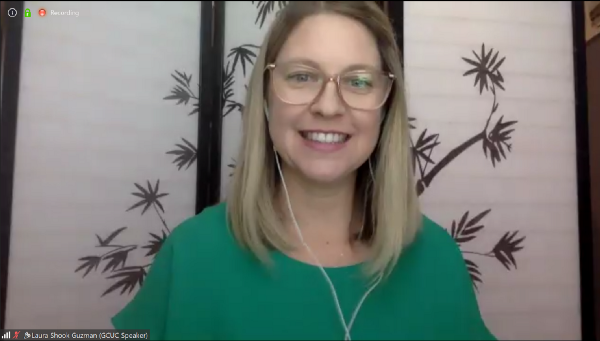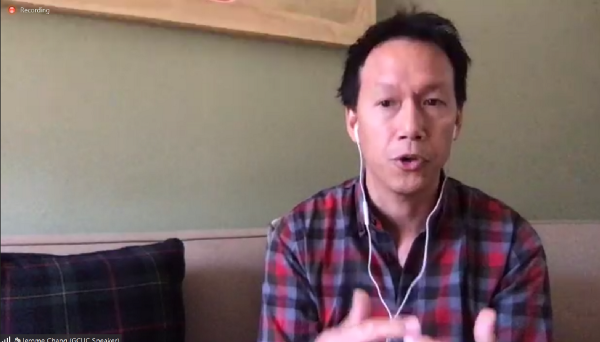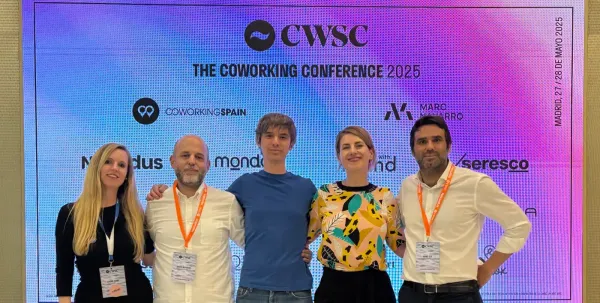This is the second part of our GCUC Online recap — you can start at the beginning here.
Applying lessons to your space and to yourself
“How well we take care of ourselves today will determine how well we be able to take care of our communities tomorrow.” — Laura Shook
If you think that stillness, the art of meditation, and introspection are for the birds: think again. After this is over, you’re going to need to be able to feel the full range of human emotions. Resilient Leadership: Staying Centered While Sustaining Your Community was all about applying this philosophy to your life and adjusting your mindset to the new reality.

Laura Shook is a therapist and trauma specialist who founded the first wellness coworking facility and is a co-founder of Women Who Cowork, and she has a simple but powerful message for everyone who’s stressed about the current time: If you’re in the coworking movement, you are already resilient. And if you don’t take a minute to breathe and access your own emotions, you won’t have enough energy later when you need it.
Aside from the standard advice to eat well, sleep plenty, and exercise, Laura shared the five steps that she guides clients through to take charge of their mental health:
- Curiosity
- Presence
- Compassion
- Process
- Balance
When you’re a coworking space operator, it’s important to think about the mental health of your members and remember that we are all in a traumatic situation. Some of your members will be forever changed. While you are not their therapist, you are a point of contact and a person they trust — ask if there are ways you can support them, and give them access to resources.
“You are rooted in a movement of collective wellbeing that is here to support you” — Laura Shook
In these times, your members need to see the power in humans needing other humans, and in humans helping other humans. Remember — you all are resilient leaders.
The importance of good air quality
In the spirit of Earth Day, Cynthia Seymour talked about the effects of air quality in Why the Air You Breathe Matters. She’s currently advising a team of climatology scientists who are attempting to bring government knowledge and data into the hands of decision-makers around the world, so that they can make informed decisions about where they work — and cowork.
We’ve known for a long time just how detrimental poor air quality can be, not just to our lungs but to our nervous system, brain functions, and development. Now, the issue is once again front-page news as intense fire seasons spread harmful particulates across urban areas and health issues linked to poor air quality have been identified as possible comorbidities for COVID-19.
In the US, generally, air pollution has been trending downwards, but it’s likely to become something more people are aware of. For coworking operators, this means measuring your air quality and consulting with indoor air specialists to maintain optimal conditions for health and cognition. Cynthia stressed that she was an outdoor — not indoor — air specialist, so she couldn’t give coworking spaces specific advice, but rather offered a general plea to take this issue seriously.
Lessons from the last recession
Closing out the speakers list was frequent GCUC collaborator Jerome Chang, with his talk Survival of the Fittest. Jerome has been running a coworking space since before the 2008 recession, during which he learned a lot about what it takes to survive hard times.

Jerome had a recommendation for how to deal with the stress and difficulty of our moment. You need to have two modes: when you put on armor, be ready to fight as if your life depends on it and prepare to absorb a few blows to survive. But when you take your armor off, you need to be kind, sensitive, understanding, and flexible. And you need to know which situations require which mode.
He fired off a lot of advice for spaces struggling right now:
- Increase your income and minimize your losses this second.
- In the last recession, when the US government bailed out the auto manufacturers, they didn’t need to bail out Ford because they were lucky enough to have restructured their debts before the financial crash. Learn from their experience and take decisive action quiclky to get cash on hand.
- Virtual memberships solve an immediate cash problem, but they do not constitute a long-term strategy: The margins on virtual memberships are too thin. Start pivoting however you can so that over the next year you are still making enough money to survive.
- Settle all your recurring payments. Shed non-essential services. Pay out your remaining contracts. You might burn some bridges, but you need to stabilize and reduce all non-essential expenses.
- Go through every line item in your bookkeeping.
- Rent is your most expensive asset. Negotiate your lease.
There’s no reason to wait — talk frankly with your landlord, open the books, and explain that with the current rent you will go out of business and they will have a hard time finding a new tenant during a pandemic. Jerome’s personal lesson from the last recession was that he was too soft on negotiating; every month he’d ask politely for a reduction but it never came. Only when he actually couldn’t pay the rent did the landlord agree to restructure.
- If your landlord won’t talk? Time to get your armor ready: Look into eviction laws and protections. Your landlord is probably making a mistake but it will still be a fight; courts are backed up and you have leverage to drag it out.
- Should you refinance if you own your own building? The general assessment right now is to wait until June or July. Companies are slammed right now, and If you can wait, you’ll get a lower rate.
- Next up is payroll. Laying off people is relatively simple, and there are benefits to your employees to be on unemployment right now. Look into furloughs, the Paycheck Protection Program, and other assistance — but be very careful to read the details.
- However long you’re prepared for — prepare for the crisis to last longer. Flexibility now is going to be about adapting to new demands, think alternating days, virtual/normal membership blends, etc. The advantage our industry has is that unlike during the last recession, today people know about coworking.
Coworking, COVID and the Future
As I mentioned in the first half of our GCUC breakdown, the cocktail hour was a highlight of the whole experience. It gave us the opportunity to discuss what we’d been hearing, and to share our thoughts on how we could apply these lessons to ourselves.
Right now, this crisis is a battle between fear and hope. We’re afraid of what it means if this is the new normal — not just for our businesses, but for society. But there’s also hope, and the general feeling that once there’s a vaccine, we’ll bounce back to our old habits and routines because humans are resilient.
I’m hopeful that we’ll be able to continue having in-person events one day — but until then, I’m grateful for the opportunity to discuss our coworking experiences over the internet, in a format that is not just more environmentally friendly, but also more personal and earnest in its own way.

If you aren’t already using Cobot as your coworking management software, give it a go! You’ll find that our features can help you run your coworking space more effectively and grow your community. Just sign up for a free trial or a live demo session. And if you have questions, our support team is all ears!
Happy Coworking!



